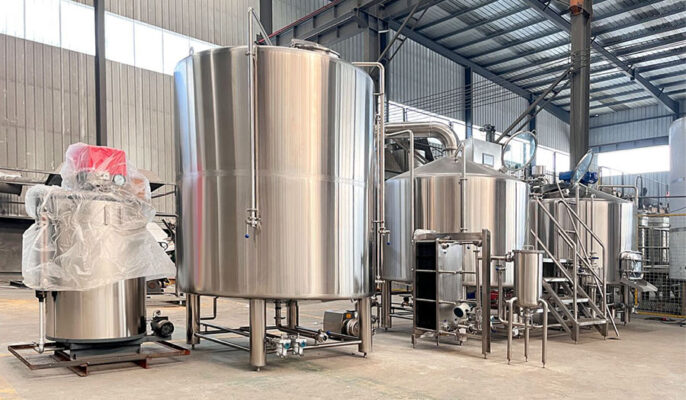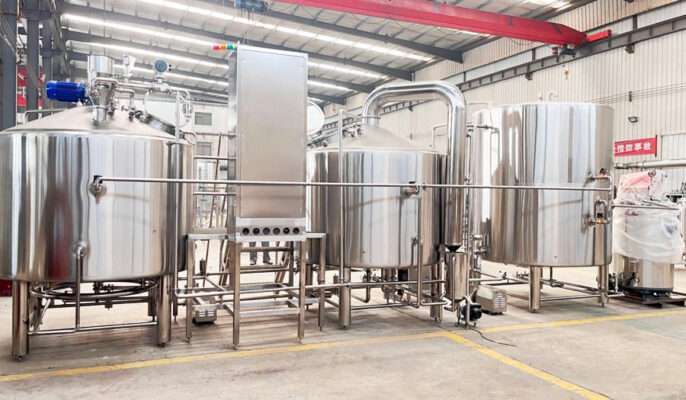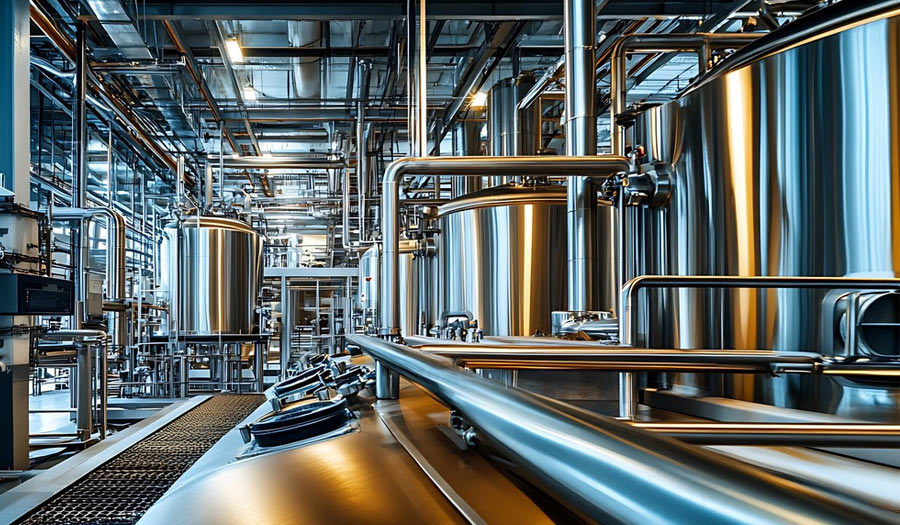양조 산업에서 턴키 양조장 시스템을 구현하는 것은 복잡합니다. 경쟁 우위를 확보하려면 생산 능력을 결정하고, 고유한 양조 라인을 개발하며, 적합한 양조 장비를 선택해야 합니다. 턴키 양조장은 일반적으로 장비 조달부터 설치 및 시운전까지 전체 프로세스를 포함하는 통합 양조 솔루션입니다. 맥주 산업에 진출하고 싶지만 양조 경험이 부족한 투자자에게 턴키 양조장은 효율적이고 편리한 옵션을 제공합니다.
턴키 양조장이란 무엇인가요?
턴키 양조장은 맥주를 양조하는 데 필요한 모든 장비와 구성품이 포함된 완전한 양조 시스템입니다. 따라서 "턴키"라는 용어는 시스템을 설치한 후 즉시 사용할 수 있으며 최소한의 설정만 수행하면 된다는 것을 의미합니다. 이러한 시스템은 맥즙통부터 발효 탱크 및 제어 패널까지 모든 것을 하나의 패키지로 제공하여 양조 과정을 단순화하도록 설계되었습니다.
턴키 솔루션의 주요 장점 중 하나는 쉽고 빠른 설정입니다. 양조장에 열쇠를 넘겨주면 거의 즉시 수제 맥주를 생산할 수 있다고 상상해 보세요. 이는 시장에 빠르게 진입하고 싶거나 양조장 설립에 필요한 기술 지식이 부족한 사람들에게 특히 유용합니다.

턴키 양조장 구성 요소
- 양조 주전자: 맥즙을 끓이고, 홉을 넣고, 살균하는 데 사용합니다. 일반적으로 스테인리스 스틸로 만들어지며 온도와 끓는 시간을 조절하는 가열 장치가 장착되어 있습니다. 끓이는 과정에서 홉의 향과 쓴맛이 방출되고 맥아즙의 불순물이 제거됩니다.
- 발효 탱크s: 맥즙을 발효시켜 맥주로 전환하는 데 사용됩니다. 일반적으로 스테인리스 스틸로 만들어지며 온도 제어 시스템과 압력 방출 장치가 장착되어 있습니다. 발효는 양조 과정에서 중요한 단계이며 맥주의 맛과 향에 직접적인 영향을 미칩니다.
- 저장 탱크: 발효 맥주를 저장하고 포장할 준비를 하는 데 사용됩니다. 일반적으로 높은 압력 내성을 가지며 냉각 시스템이 장착되어 있습니다. 맥주를 적절한 조건에서 보관하여 품질과 맛을 향상시킬 수 있습니다.
- 몰트 밀: 맥아를 갈아서 매시 효과를 높이고 다양한 분쇄 방법을 사용하여 입자 크기를 제어하며, 분쇄가 미세할수록 매시 효과가 좋아져 궁극적으로 맥주의 맛과 알코올 함량에 영향을 미칩니다.
- 물 처리 시스템: 추출수를 여과하고 처리하여 불순물을 제거합니다. 활성탄 여과, 역삼투압, 이온 교환과 같은 기술이 포함됩니다. 수질은 맥주의 맛과 품질에 직접적인 영향을 미치므로 물의 순도를 확보하는 것이 중요합니다.
- 충전 기계: 병, 캔 또는 배럴에 맥주를 채웁니다. 일반적으로 고속의 정밀한 충전 시스템을 갖추고 있습니다. 효율적인 충전을 통해 산소 유입을 줄이고 맥주의 신선도를 유지할 수 있습니다.
|
장비 이름 |
기능 설명 |
대략적인 가격(USD) |
|
양조 주전자 |
맥즙을 끓이고 홉을 넣을 때 사용합니다. |
15,000 - 100,000 |
|
발효 탱크 |
맥아즙을 맥주로 전환하는 발효 과정에 사용됩니다. |
10,000 - 50,000 |
|
저장 탱크 |
발효 맥주 보관, 포장 준비 완료 |
5,000 - 30,000 |
|
몰트 밀 |
후속 매싱 공정을 위해 맥아를 분쇄합니다. |
5,000 - 20,000 |
|
수처리 시스템 |
수질이 양조 기준을 충족하도록 보장하고 불순물을 제거합니다. |
3,000 - 15,000 |
|
CIP 장비 |
추출 장비를 세척 및 살균하여 위생을 보장합니다. |
10,000 - 30,000 |
|
맥주병이나 캔을 채우고 밀봉하여 판매할 준비를 하는 데 사용됩니다. |
20,000 - 150,000 |
턴키 양조장에는 어떤 유형이 있나요?
- 소규모 턴키 양조장: 일반적으로 1~5배럴의 생산 능력을 갖춘 소규모 양조장입니다. 스타트업, 소규모 양조업체 또는 홈브루어에게 더 적합합니다. 양조 장비는 주로 기본 양조 냄비, 발효 탱크, 저장 탱크 등 간단합니다. 투자 비용이 적고 위험 부담이 적어 시장 테스트와 새로운 맛 개발에 적합합니다.
- 중간 규모의 턴키 양조장: 생산 용량이 5배럴에서 20배럴 사이이며 장비 구성이 비교적 완벽합니다. 생산 규모를 확장하고자 하는 수제 맥주 양조장 또는 소규모 상업용 맥주 양조장에 적합합니다. 고급 양조 장비, 포장 장비 및 수처리 시스템을 포함하여 더 큰 시장의 요구를 충족할 수 있으며 유연성이 높습니다.
- 대형 턴키 양조장: 생산 용량은 20배럴 이상으로 대규모 생산에 적합합니다. 시장에 빠르게 진입하고자 하는 대규모 상업용 양조장 또는 투자자에게 적합합니다. 종합적인 양조, 발효 및 포장 장비와 자동 제어 시스템을 포함합니다. 높은 효율성과 생산 능력으로 다양한 시장 유통에 적합합니다.

턴키 양조장의 양조 프로세스
- 매싱: 빻은 곡물(주로 맥아 보리)을 뜨거운 물과 섞어 매시 툰에 넣습니다. 열은 곡물의 전분을 발효 가능한 당분으로 전환하는 효소를 활성화하여 매시라고 하는 걸쭉한 죽 같은 혼합물을 만듭니다.
- 여과: 매싱이 완료되면 액체는 라우터 툰이라는 용기로 옮겨집니다. 여기서 고형물에서 맥즙이 분리되고 액체는 이제 맥아즙이라고 불립니다.
- 끓이기: 맥즙을 양조 주전자에서 끓이는데, 보통 한 시간 정도 걸립니다. 이 과정에서 홉을 첨가하여 맥주에 쓴맛, 풍미, 향을 더합니다. 또한 끓이면 맥즙이 살균되어 해로운 미생물이 발효 과정을 방해하지 않습니다.
- 냉각: 끓인 후에는 맥즙을 효모 발효에 적합한 온도로 빠르게 식히는 것이 중요합니다. 이러한 빠른 냉각을 위해 열교환기를 사용하는 경우가 많습니다.
- 발효: 냉각된 맥즙을 발효 탱크로 옮기고 효모를 첨가합니다. 효모는 맥아즙의 발효 가능한 당분을 소비하여 이 과정에서 알코올과 이산화탄소를 생성합니다.
- 포장하기: 발효가 완료되고 맥주가 숙성되면 포장할 준비가 된 것입니다. 양조장의 능력에 따라 맥주는 병, 캔 또는 통에 포장할 수 있습니다.
선택해야 하는 이유 턴키 양조장 시스템?
원스톱 솔루션
턴키 시스템은 수요 분석, 설계, 장비 조달부터 설치 및 시운전까지 원스톱 서비스를 제공합니다. 기업은 더 이상 여러 공급업체 간의 조율에 시간과 에너지를 소비할 필요가 없으므로 프로젝트 관리가 간소화됩니다. 공급업체는 일반적으로 고객의 요구와 공간 배치에 따라 장비를 맞춤화하여 장비가 적절하게 구성되고 효율적으로 작동하도록 합니다.
디바이스 호환성
모든 양조 장비(양조 포트, 발효기, 포장 기계 등)는 생산 시 기술적 병목 현상을 최소화하기 위해 원활하게 연결될 수 있도록 신중하게 선택됩니다. 장비 자체가 서로 호환되도록 설계되어 디버깅 및 테스트 시간이 크게 단축되므로 기업이 신속하게 생산 단계에 진입할 수 있습니다.
위험 감소
턴키 시스템은 검증된 기술과 장비를 사용하므로 새로운 기술이나 장비의 불안정성과 관련된 위험을 줄일 수 있습니다. 공급업체는 종종 상세한 운영 매뉴얼과 기술 지원을 제공하여 기업이 잠재적인 문제에 대처하고 장비 고장으로 인한 생산 중단의 위험을 줄일 수 있도록 도와줍니다.
전문가 지원
공급업체는 일반적으로 와인 메이커가 장비를 능숙하게 사용할 수 있도록 운영 절차, 장비 유지보수 및 문제 해결을 포함한 직원 교육을 제공합니다. 판매 후 지원이 잘 이루어지면 장비 문제가 발생했을 때 적시에 해결책을 제공하여 생산 중단 시간을 줄일 수 있습니다.

유연성
많은 턴키 시스템을 기업의 특정 요구에 맞게 조정할 수 있으므로 시장 수요 변화에 따라 생산 능력을 유연하게 조정할 수 있습니다. 기업은 소비자 선호도에 따라 신제품을 신속하게 출시하고 시장 적응력을 높일 수 있습니다.
확장성
많은 턴키 시스템을 통해 기업은 생산 라인을 추가하거나 새로운 장비를 도입하는 등 시간이 지남에 따라 확장하여 시장 변화에 적응할 수 있습니다. 또한 시스템의 설계는 일반적으로 향후 기술 업그레이드를 고려하므로 기업은 전체 구조를 크게 변경하지 않고도 새로운 기술을 도입할 수 있습니다.
자주 묻는 질문
턴키 양조장이란 무엇인가요?
턴키 양조장은 일반적으로 장비 조달, 설계, 설치, 시운전 및 교육과 같은 서비스를 포함하여 완벽한 맥주 생산 솔루션을 제공하는 시스템입니다.
턴키 양조장 비용은 얼마인가요?
턴키 양조장의 비용은 규모, 장비 구성, 시장 수요에 따라 달라집니다. 일반적으로 초기 투자 비용은 수만 달러에서 수백만 달러까지 다양합니다.
턴키 양조장이 생산에 투입되기까지 보통 얼마나 걸리나요?
생산에 투입되는 시간은 일반적으로 프로젝트의 규모와 복잡성에 따라 달라집니다. 일반적으로 계약 체결부터 설치 및 시운전 완료까지 몇 개월이 소요될 수 있습니다.
올바른 턴키 양조장 공급업체를 선택하는 방법은 무엇인가요?
공급업체를 선정할 때는 업계 경험, 고객 평가, 기술 지원 능력, 장비 품질, 맞춤형 서비스 역량 등의 요소를 고려해야 합니다.




